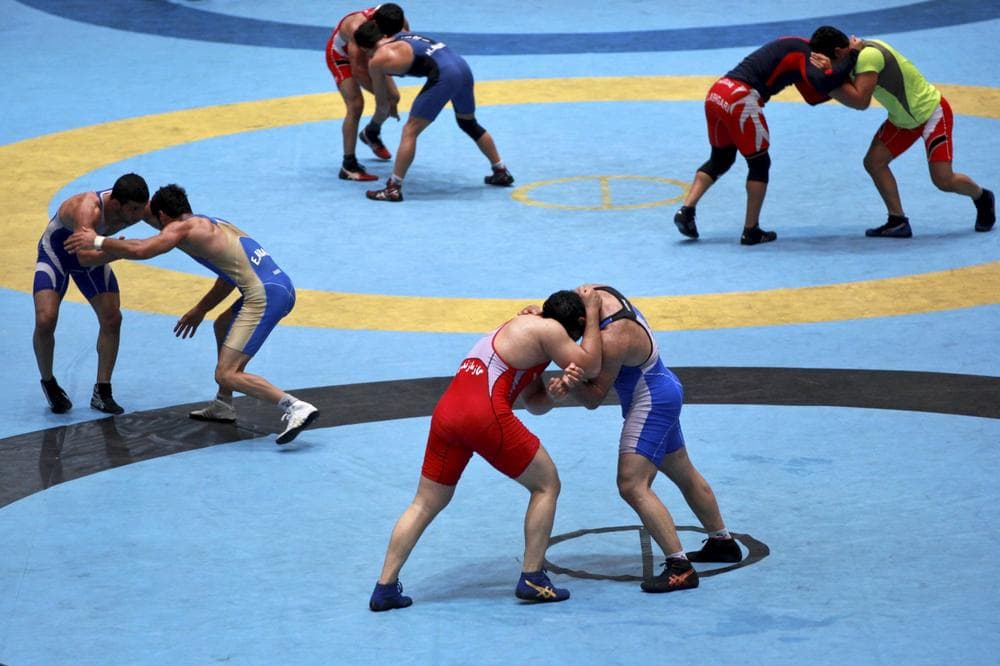Advertisement
In The News
An Olympic Update With John Powers

The International Olympic Committee met in Argentina where they made several important announcements. Bill Littlefield spoke with John Powers, the Olympic correspondent for The Boston Globe, about these changes.
Highlights From Bill's Conversation with John Powers
BL: The Lords of the Rings decreed that wrestling shall return to the games. I gather that you weren't surprised that the sport traditionally associated with the Olympics beat baseball/softball as well as squash to claim that honor.
JP: Whats interesting here is the whole point of having these possibilities was to "refresh and renew," that's their words, the program. So what you do? You go back to a sport that's been with you for 3,000 years and you keep it. It is, however, new and improved. They changed the whole passivity rule and have a couple more events for women and that kind of stuff. But it just seems that these are all things that could be hammered out behind closed doors, you know, nine months ago.
BL: What prompted the ring lords to select Tokyo over Istanbul or Madrid?
JP: I think there was just enough concern about the Spanish economy and whether it would be any better. I mean you are looking at a country where more than one in every four adults is unemployed. Bad economy. Turkey had had some civic unrest, huge building list — almost $19 million of stuff they had to build. So it is very telling that Tokyo was considered the safe bid which is 150 miles from a busted nuclear reactor which is leaking water.
BL: Yeah, I guess they figure in seven years they better have that fixed or its going to be irrelevant that they got chosen for the Olympics.
JP: That's right. I mean, I think all along people thought that Tokyo would be a very good choice. They had already set aside $5 billion to build stuff. They have held The Games before. They did a very nice job with Nagano in 1998. So had it not been for the whole radioactive issue this election would not have been anywhere close. What was a bit surprising was that Madrid was out before Istanbul was. This was a city that has built 80 percent of everything that it really needed, had been runner-up last time. In the old days that would have been enough.
BL: The news out of Russia, site of the 2014 Winter Games, has been about corrupt building practices, potentially warm weather, and the way gay athletes and gay spectators may be treated. Have you news on any or all of those fronts?
JP: What is going to be interesting there — and this is one of the questions for Bach when he is over — historically the IOC has not wanted to interfere with laws of the host nation. Which actually got it in a mess in 1936 with the Nuremberg Laws which basically made Jews be non-citizens of Germany. And I think they've tried to say, 'We aren't going to tell the Russians what to do.' But I think what may happen is the athletes might be told, just to be safe, don't be wearing rainbow pins, don't be holding hands in public, don't make a protest. So my guess is it will be a "Don't Ask Don't Tell." It basically shows Russia's problem with human rights. I mean that was the biggest complaint when Sochi got the games is that you were giving the games to an oppressive regime that's only going to get more so by the time the games are held.
BL: How are the Brazilians doing in terms of preparations for the summer games in 2016, assuming anyone there is even thinking of the Olympics as the 2014 World Cup looms?
JP: Well, basically the IOC came by for yet another look and basically said, "Get out of samba mode -- hurry things up a bit," because they are very concerned cause so much building has to be done down there. They have multiple clusters. One hasn't even really been built yet. Massive transportation issues — which by themselves would be a lot, but you're talking about a country that's hosting a World Cup next summer and is spending billions on that and a lot of time and energy on that. Will they be able to turn it around, not in two years, but in one year's time because all that stuff has to be done for test events by the summer of 2015. So if you've ever seen Brazilians quick-step, you'll be seeing it soon.
This segment aired on September 14, 2013.